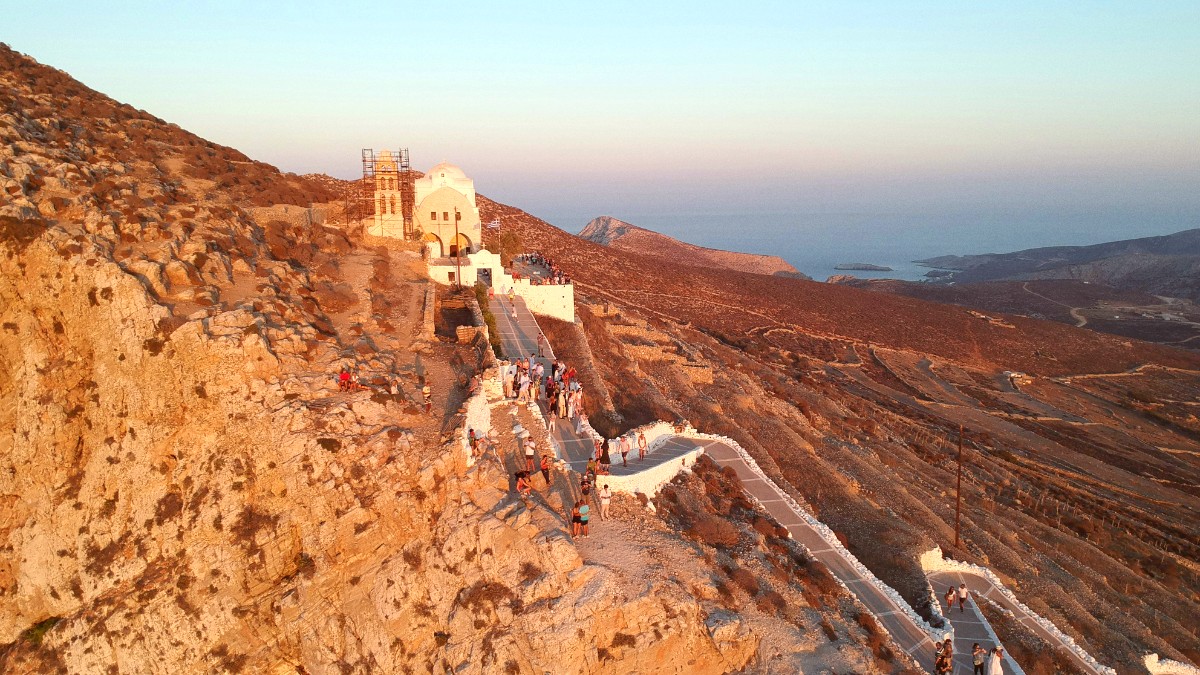
Greece
Folegandros experiences a typical Mediterranean climate, with hot, dry summers and mild, wet winters. Picking the right time to visit greatly influences your experience, based on your preferred activities and tolerance for crowds.
The Meltemi winds, notably prevalent from July to August, are a prominent weather factor. These winds, while a heat respite, make for rough seas. This often leads to ferry delays or cancellations, which impact travel plans. Always check ferry schedules on your travel days.
Consider visiting in early June or mid-September. These times present an excellent balance of pleasant weather, warm seas, and fewer crowds, making for a relaxed and enjoyable trip.
High season brings lively atmosphere and warm sea, but also crowds and higher prices. Shoulder season means pleasant temperatures and fewer crowds. Low season shows an authentic local Folegandros with very few tourists, but many businesses close and ferry connections become limited.
Peak Crowds & Prices
All services operate, lively atmosphere, warm sea, frequent ferries.
Crowded, highest prices, Meltemi winds make for rough seas, high temperatures.
Pleasant & Balanced
Pleasant temperatures for hiking, fewer crowds, lower prices, warm enough sea.
Some smaller businesses may close early/late, less frequent ferries.
Quiet & Local
Authentic local experience, very few tourists, lowest prices, lush landscape in spring.
Many businesses close, very limited ferry connections, cooler temperatures, more rain.
Greece is part of the Schengen Area. Entry requirements for Folegandros align with those for the entire Schengen Area. Non-EU/EEA/Swiss citizens typically need a Schengen visa for stays up to 90 days within any 180-day period. Apply for this visa at the embassy or consulate of the main Schengen country you intend to visit. Citizens of many countries, including the USA, Canada, Australia, New Zealand, and the United Kingdom, enter visa-free for tourism, for up to 90 days within any 180-day period. This visa-free status applies to tourism, business, or transit purposes.
The European Union plans to implement ETIAS (European Travel Information and Authorisation System) by mid-2025. Non-EU citizens currently enjoying visa-free travel will need an ETIAS authorization. This is a travel authorization, not a visa. Your passport must be valid for at least three months beyond your intended departure date from the Schengen Area, issued within the previous 10 years, and have at least two blank pages. You may need to show proof of a return/onward ticket, accommodation, and sufficient funds. Travel insurance is mandatory for Schengen visa applicants and highly recommended for all other travelers, covering medical emergencies, hospitalization, and repatriation, with a minimum coverage of €30,000.
Required for many non-EU citizens for stays up to 90 days.
Available for citizens of many countries (e.g., USA, UK, Canada).
Travel authorization for visa-free travelers, expected by mid-2025.
3 months beyond departure, issued within 10 years, 2 blank pages.
May be requested at border for proof of stay and exit.
Folegandros, while not as expensive as Santorini or Mykonos, is also not Greece's cheapest island. Costs vary significantly based on your travel style and the season.
The official currency in Folegandros, and throughout Greece, is the Euro (€). ATMs are available in Chora and Karavostasi (the port). These machines typically dispense Euros and accept major international debit and credit cards. Credit cards, mainly Visa and Mastercard, are widely accepted in hotels, larger restaurants, and more established shops.
Costs vary significantly based on your travel style and the season. These estimates cover accommodation, meals, and general transport.
Folegandros maintains a very low crime rate, considered an exceptionally safe destination. Serious crime is almost unheard of. Petty crime is rare but can happen in crowded areas like ferry ports during peak season. No specific neighborhoods on the island are unsafe.
Folegandros's climate dictates much of your wardrobe choices. Prepare for sun, wind, and varying temperatures based on the season. Remember to pack light. Moving between islands with heavy luggage on ferries is cumbersome. Focus on versatile clothing and items you truly need.
Pack breathable fabrics like cotton and linen. Include Swimsuits, shorts, t-shirts, and sundresses.
The strong Meltemi winds mean evenings feel cooler. Bring a Light jacket, cardigan, or Shawl.
A wide-brimmed Sun hat and Sun protection are absolute necessities for daytime activities.
Layering is
Shoulder Season (April-May, Sept-Oct): This period calls for a mix of summer clothing and warmer layers. Long-sleeved shirts, light sweaters, or fleeces are good for cooler evenings or early mornings. A light Waterproof jacket is useful for occasional rain showers, especially in autumn.
Winter (November-March): For a winter visit, pack warmer layers, sweaters, jeans or trousers, and a warm coat or jacket. A scarf provides extra warmth. A waterproof outer layer is advisable due to higher chances of rain.
Many businesses close in winter, so warm clothing for indoor spaces is also useful.
When visiting churches or monasteries, modest attire is appreciated and often required. Both men and women should have their shoulders and knees covered. Carrying a Light scarf or sarong helps quickly adapt your outfit.
Swimwear belongs on beaches and by pools; avoid wearing it in villages or other public areas.
Lightweight hiking shorts or pants, combined with Moisture-wicking shirts, make you comfortable on the island's trails.
Choosing the right footwear makes a big difference for exploring Folegandros's diverse terrains.
Keeping important documents organized and accessible smooths your travel and handling of unforeseen circumstances.
Original passport, visa documentation (if applicable), and an International Driving Permit (IDP) alongside your national driver's license if you plan to drive. Also, student/senior/press IDs for discounts.
Travel insurance policy information (digital and printed), vaccination records, and health documentation (especially for prescription medications). A list of emergency contact numbers (family, embassy, bank).
Printed and digital copies of all reservations (accommodation, ferries, car rentals). Cloud storage services (Google Photos, Dropbox) for backing up photos and documents regularly.